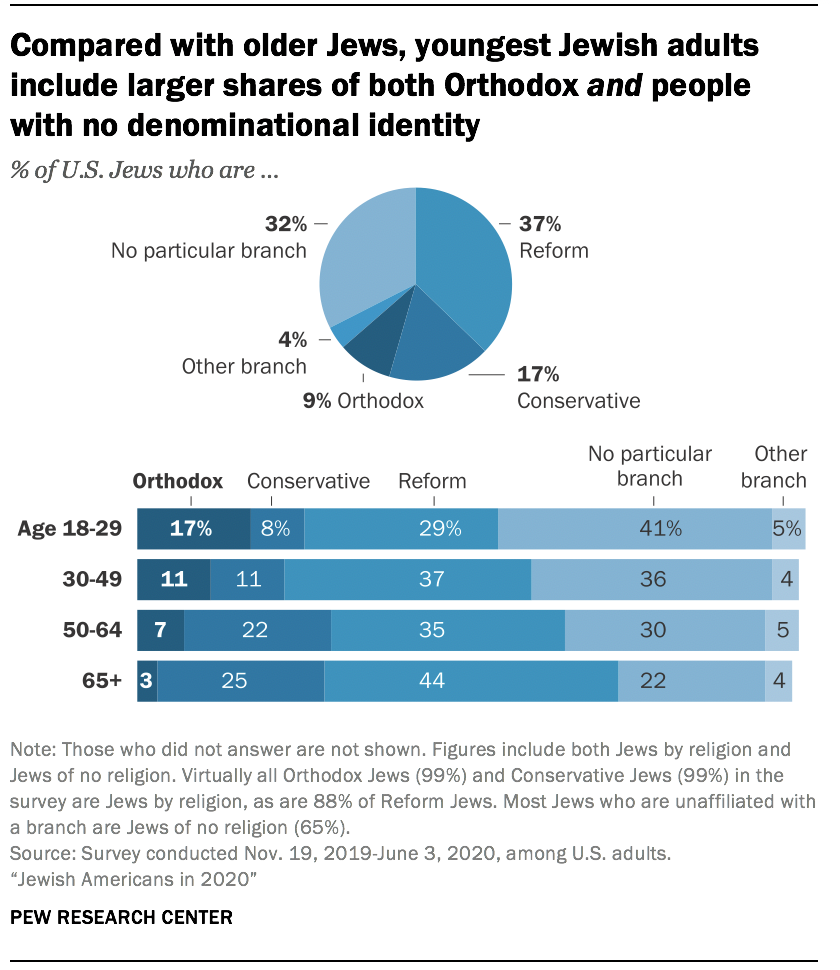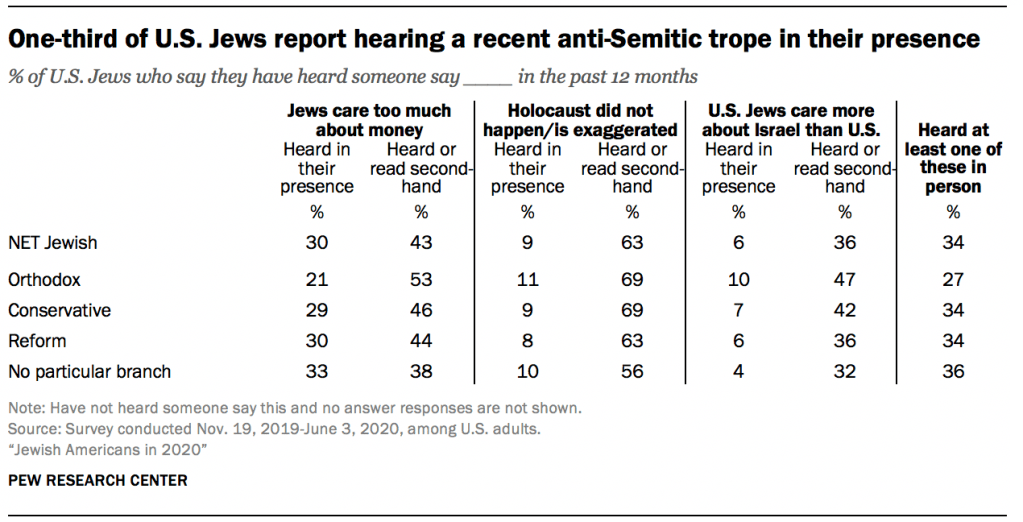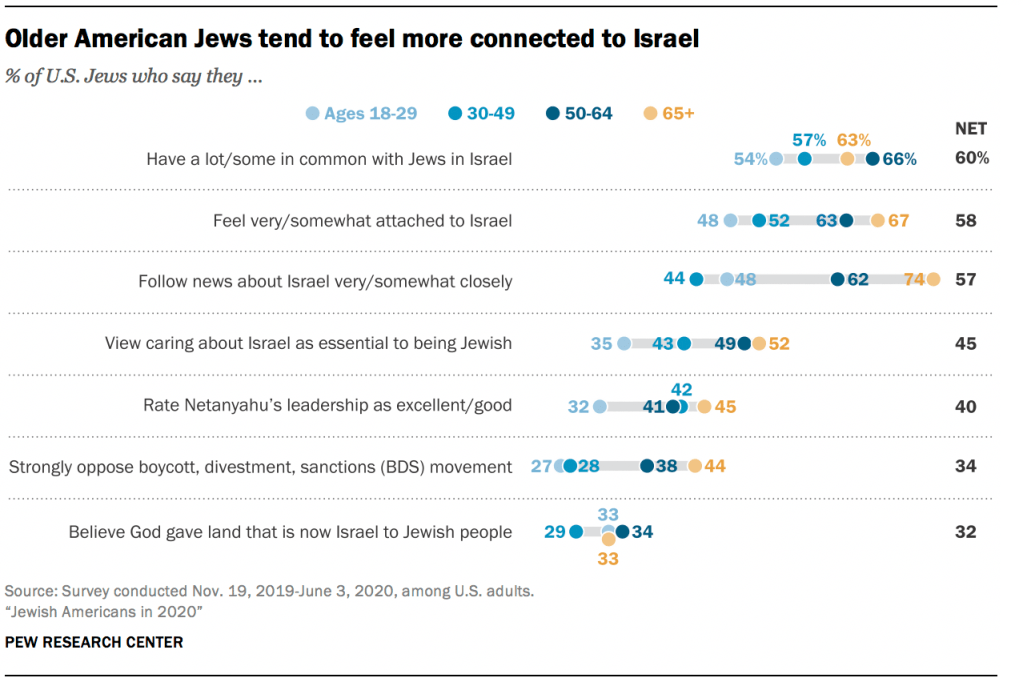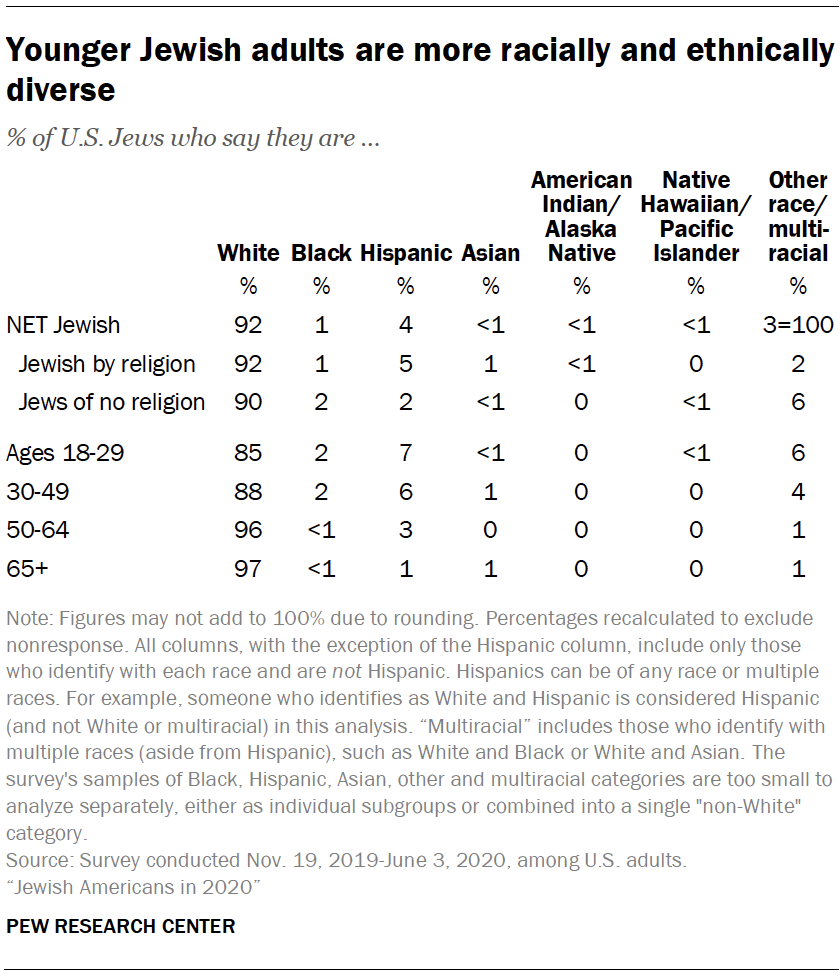In 2013, the Pew study “A Portrait of Jewish Americans” shocked Jewish communal leaders and prompted a mad dash to rework institutional priorities and engage more Jews. The study showed a community with record rates of intermarriage, rapid denominational disaffiliation, and a growing rejection of Judaism as a religion.
Now, the Pew Research Center is back for round two with a study simply titled “Jewish Americans in 2020,” organized largely before the COVID-19 pandemic hit. The main finding (with the caveat from researchers that, due to methodology, the 2013 and 2020 studies shouldn’t be compared too much): The more things change, the more they stay the same.
After seven years, generational trends among 7.5 million American Jews still show that Conservative and Reform movements are losing ground among younger generations to Orthodox Judaism and a non-denominational Jewish identity.
Shifting Jewish identities reveal a community extremely polarized by politics, largely intermarried, and becoming more diverse.
Here’s what you need to know:
- Jews of no religion, meaning Jews who consider themselves culturally or ethnically Jewish but don’t identify with religion, are increasing. Among Jewish adults 65+ years of age, 16% are of no religion. For the 18-29 age group, 40% are of no religion.
- Jews of no religion are less likely to be involved in the Jewish community; to participate in Jewish activities; and to feel an attachment to the broader Jewish community or Israel.
- Young Jews feel less connected to Israel. Roughly half of the 18-29 age group “describe themselves as very or somewhat emotionally attached to Israel (48%), compared with two-thirds of Jews ages 65 and older.” [GRAPHIC done]
- Intermarriage rates are high, at 61% for all Jewish adults, and younger adults care less about marrying Jewish.
- However, adults under the age of 50 who have intermarried parents are more likely to stay Jewish than in older generations. Per Pew: “The share of the offspring of intermarriages who choose to be Jewish in adulthood seems to be rising.”
One area that wasn’t addressed as much in the 2013 Pew study was antisemitism. Alan Cooperman, the director of religion research at the Pew Research Center, said that as the study was being developed in 2012, there was unanimous agreement that antisemitism was “not a pressing concern.”
“This time around, in the wake of events in Charlottesville and the shootings in synagogues in Pittsburgh and Poway, Calif., we asked many more questions about antisemitism,” Cooperman said.
- Three-quarters of Jewish adults say antisemitism has increased over the past five years. Still, only 5% of Jews chose not to participate in Jewish activities out of concern for their safety.
- More Jews have heard antisemitic tropes (for example, someone saying the Holocaust didn’t happen) secondhand than have experienced them firsthand.
Asked why they thought there was more antisemitism, most Jewish adults said that antisemites felt freer to express their views — or that there were both more antisemites nowadays, and that antisemites were emboldened to speak up.
The political polarization of Jewish groups, a trend visible in 2013 but that, like many issues, heavily escalated in the second half of the 2010s, was also given a deeper look by Pew researchers.
- Orthodox and non-Orthodox Jews are deeply divided. Politically, Orthodox Jews are Republican at roughly the same rate (75%) as non-Orthodox Jews are Democratic.
- Half of all Orthodox Jews say they have little to nothing in common with Reform Jews, a sentiment matched by 60% of Reform Jews.
- On the whole, Conservative and Reform Jews say they have more in common with Israeli Jews than Orthodox Jews. Orthodox Jews also feel closer to Israeli Jews than to American non-Orthodox Jews.
Finally, as conversations about race and diversity have taken center stage in the American Jewish community, Pew broke down Jewish demographics. A focus on race is, in some ways, intertwined with intermarriage, as 17% of Jewish adults live in a household with at least one non-white or multiracial person (who may or may not be Jewish).
- Nine percent of Jewish adults identify as gay, lesbian, or bisexual, with another three percent who either didn’t answer the question; didn’t know their gender; or identified as “something else.”
- American Jews are becoming more diverse. Of all Jewish adults, 92% identify as white. But for the 18-29 age group, 15% identify with non-white demographic categories like Hispanic (7%) and Black (2%).
To help bring context to the “Jewish Americans in 2020” study, Pew Research organized a webinar on Tuesday that included a walkthrough by some of the researchers, and a discussion panel and Q&A with four prominent Jewish communal professionals.
A few notable quotes were prompted by a question for Rabbi B. Elka Abrahamson, the president of the Wexner Foundation, about how communal leadership can help bridge a fractured American Jewish community.
“The Jewish communal ecosystem must evolve in order to accommodate Jews, however, they self-define in a variety of stages and phases of identity and connection,” Abrahamson said. “If we are going to define ourselves as one people, today is a wake-up call.
“We need to be relentlessly curious not just about the data, but about individuals, about the lived experience of people we might not understand. We have to replace outrage with curiosity.”
Abrahamson noted, as other speakers had done, how after seven years and the 2013 Pew-driven scramble for new initiatives to engage Jews, nothing Jewish organizations and professionals had done helped with divisions in the community.
“That is a pattern we can break for the better if we get really serious about change,” she said.


























So basically for those that got married since 2010 the intermarriage rate was 61% (72% for the non-Orthodox). While only 28% of the children from these marriages are being raised Jewish by religion. It does not bode well for the future. Right now we are on track to losing millions of people.
We really need to put more resources in the Jewish community toward Jewish education.
We also need an initiative to explain to people why it is so important to marry within the fold and all of our leaders really need to start taking that position. We need to change the way people think and return to Jewish values. Based on the study only 34% said it was very important that their grandchildren be Jewish and only 22% thought it was very important for their grandchildren to marry someone who is Jewish.
Whatever needs to be done to enhance people to remain Jewish, MUST be done in as pleasant a manner as possible! I think the way of closing doors is abominable. The doors
MUST always be left open so they can come home